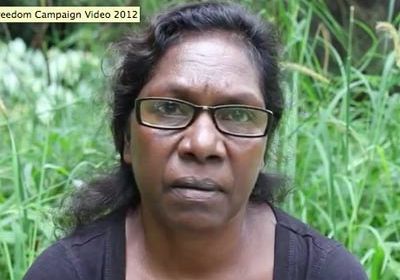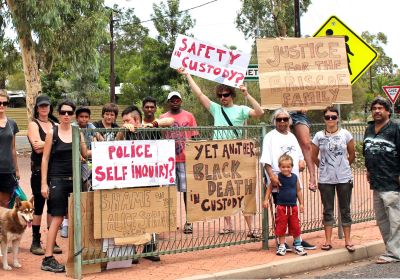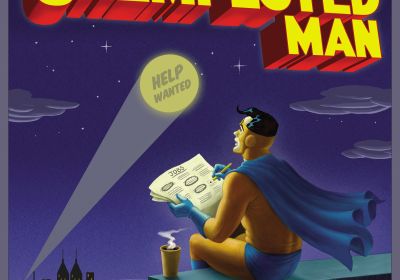
-
 Federal resources minister Martin Ferguson released a report on May 14 into Australia’s gas reserves. The report signalled a huge expansion of gas mining in the NT and bad news for the environment. Two new areas have been opened for gas exploration: shale gas exploration in the central NT, and conventional offshore gas exploration north-west of Darwin. Both of these present serious environmental problems. The shale gas industry relies on capturing gas by pumping sand, water and chemicals into the ground — a process commonly known as fracking.
Federal resources minister Martin Ferguson released a report on May 14 into Australia’s gas reserves. The report signalled a huge expansion of gas mining in the NT and bad news for the environment. Two new areas have been opened for gas exploration: shale gas exploration in the central NT, and conventional offshore gas exploration north-west of Darwin. Both of these present serious environmental problems. The shale gas industry relies on capturing gas by pumping sand, water and chemicals into the ground — a process commonly known as fracking. -

New legislation introduced by the federal Labor government will entrench many aspects of the Northern Territory Emergency Response, the NT intervention, for 10 years. The Senate Community Affairs References Committee released the findings of its inquiry into the Stronger Futures in the NT Bill and related legislation on March 13. It suggests some minor amendments, but leaves the substantive content of the bill unchallenged.
-

Prime Minister Julia Gillard anointed former NSW premier Bob Carr as Australia's foreign minister on March 2. His appointment awaits the approval of a joint sitting of NSW parliament, but for all intents and purposes, Carr has just been catapulted to the third-highest political post in the land after being out of politics since 2005.
-
 As 2000 Aboriginal people and their supporters gathered at the 40th anniversary celebrations of the Tent Embassy in Canberra, Coalition leader Tony Abbott said: “I can understand why the Tent Embassy was established all those years ago. I think a lot has changed for the better since then… I think it probably is time to move on from that.”
As 2000 Aboriginal people and their supporters gathered at the 40th anniversary celebrations of the Tent Embassy in Canberra, Coalition leader Tony Abbott said: “I can understand why the Tent Embassy was established all those years ago. I think a lot has changed for the better since then… I think it probably is time to move on from that.” -
 The Beginning of the American Fall Stephanie McMillan Cartoonmovement.com The Adventures of Unemployed Man Erich Origen and Gan Golan Little, Brown, October 2010. 80 pp. Action Comics Grant Morrison Detective Comics The worldwide Occupy protests have inspired a lot of music over the past few months. But it has also broken into artistic circles some might not know of. One such area is comics.
The Beginning of the American Fall Stephanie McMillan Cartoonmovement.com The Adventures of Unemployed Man Erich Origen and Gan Golan Little, Brown, October 2010. 80 pp. Action Comics Grant Morrison Detective Comics The worldwide Occupy protests have inspired a lot of music over the past few months. But it has also broken into artistic circles some might not know of. One such area is comics. -
US President Barack Obama announced during his visit to Australia on November 17 a deal with Australia to base 2500 US marines in Darwin. The deal militarises the Asia Pacific and cements Australia as an ally of US imperialist designs in the region. Obama said a US marine task force would be set up in Darwin for humanitarian and disaster relief efforts, but advanced military training, including live firing of ammunition, will be part of the cooperation deal.
-
 Twenty people protested against the expansion of US military presence in the Northern Territory when US President Barack Obama visited Darwin on November 17. During his visit to Australia, Obama announced a plan to use the Robertson Barracks to host a force of US marines for training and intervention in the Asia-Pacific. The force is to start at 250 marines and expand to 2500 by 2016. The Australian Labor government and the Coalition opposition have welcomed the US base plan.
Twenty people protested against the expansion of US military presence in the Northern Territory when US President Barack Obama visited Darwin on November 17. During his visit to Australia, Obama announced a plan to use the Robertson Barracks to host a force of US marines for training and intervention in the Asia-Pacific. The force is to start at 250 marines and expand to 2500 by 2016. The Australian Labor government and the Coalition opposition have welcomed the US base plan. -
 In the wake of acts of self-harm and protests by detained refugees, people in Darwin gathered to show their support for a more humane refugee solution. Twenty people rallied outside the offices of the Department of Immigration and Citizenship (DIAC) on October 26 to call for and end to mandatory detention and oppose the proposed new detention centre at Wickham Point.
In the wake of acts of self-harm and protests by detained refugees, people in Darwin gathered to show their support for a more humane refugee solution. Twenty people rallied outside the offices of the Department of Immigration and Citizenship (DIAC) on October 26 to call for and end to mandatory detention and oppose the proposed new detention centre at Wickham Point. -
 Five refugees staged a rooftop protest for a several hours at the Northern Immigration Detention Centre on September 15. The group carried banners reading: “We need help” and “People smugglers and [the Department of Immigration and Citizenship] are the same, both playing with our life.” The refugees called for shorter processing times for their claims. One of the protesters said he was from Kuwait and had spent 16 months in detention. “I am not the longest one here, either,” he said.
Five refugees staged a rooftop protest for a several hours at the Northern Immigration Detention Centre on September 15. The group carried banners reading: “We need help” and “People smugglers and [the Department of Immigration and Citizenship] are the same, both playing with our life.” The refugees called for shorter processing times for their claims. One of the protesters said he was from Kuwait and had spent 16 months in detention. “I am not the longest one here, either,” he said. -
 A dozen members of Darwin's legal community presented a letter to ALP MP Warren Snowdon on September 2 calling for the federal government to comply with the High Court's recent decision on the "Malaysian Solution". The High Court said the ALP government's plan to deport refugees to Malaysia was illegal. The letter called on federal politicians to ensure the speedy resolution of asylum seeker claims, universal access to legal representation and an end to mandatory detention.
A dozen members of Darwin's legal community presented a letter to ALP MP Warren Snowdon on September 2 calling for the federal government to comply with the High Court's recent decision on the "Malaysian Solution". The High Court said the ALP government's plan to deport refugees to Malaysia was illegal. The letter called on federal politicians to ensure the speedy resolution of asylum seeker claims, universal access to legal representation and an end to mandatory detention. -
Curator Vikki Riley opened Footprints of my Heart ― an exhibition of artwork by 20 refugees in the Darwin region ― on August 11. The exhibition ran at the Darwin Supreme Court from August 11 to 19. Many of the artists were still in detention, at the Northern Immigration Detention Centre, the Airport Lodge or the Asti Hotel under guard. Some of the artists were regarded as “high risk” by immigration authorities and were accompanied to the opening by three security guards each.
-
 Five activists from Anti-Nuclear NT (ANNT) gathered outside the offices of Energy Resources Australia (ERA) on August 9. They were congratulating the company on its decision to abandon plans to use acid heap leeching at its Ranger uranium mine in Kakadu national park. Acid heap leeching uses thousands of tonnes of highly toxic acid to release uranium oxide from the soil. It would have sent hundreds of acid-filled trucks along the Northern Territory’s Stuart Highway each day.
Five activists from Anti-Nuclear NT (ANNT) gathered outside the offices of Energy Resources Australia (ERA) on August 9. They were congratulating the company on its decision to abandon plans to use acid heap leeching at its Ranger uranium mine in Kakadu national park. Acid heap leeching uses thousands of tonnes of highly toxic acid to release uranium oxide from the soil. It would have sent hundreds of acid-filled trucks along the Northern Territory’s Stuart Highway each day.